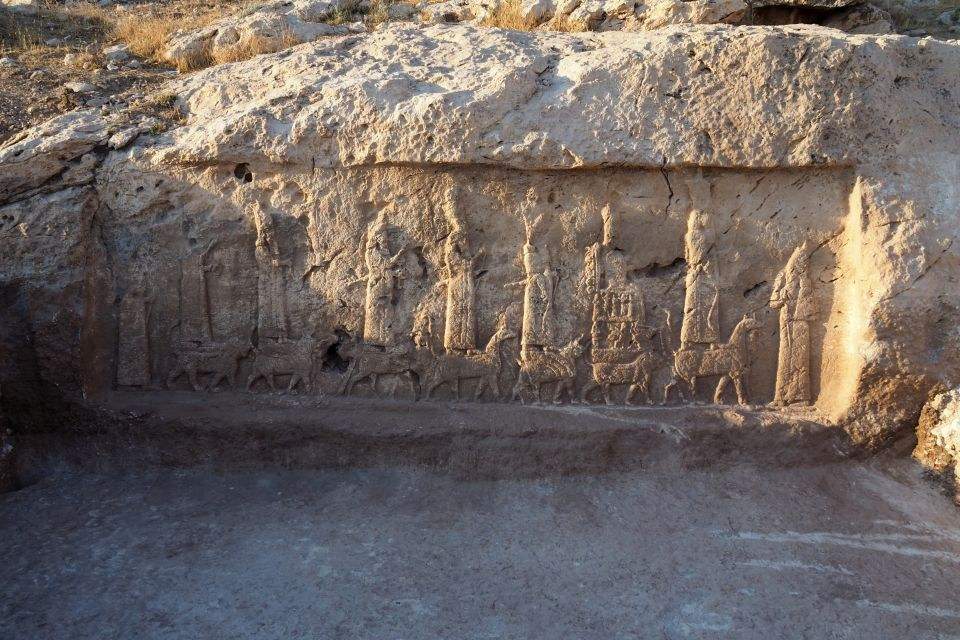The World Prize for Archaeology named after Khaled Al-Asaad has been awarded to theUniversity of Udine: the discovery of the Faida rock reliefs is the most important archaeological discovery of 2019.
These are ten rock bas-reliefs dating back to the 8th century B.C. depicting the ruler and great gods of Assyria found at the archaeological site of Faida in northern Iraqi Kurdistan. These impressive reliefs, nearly 5 meters long and 2 meters high, are carved into the rock along an ancient irrigation canal. The bas-relief carved panels depict a scene of deep religious and ideological significance centered on the king’s worship of deities and the celebration of the creation of this important hydraulic infrastructure intended to ensure fertility for the surrounding land. The project that led to the important discovery was part of the Kurdish-Italian Faida Archaeological Project, led by the University of Udine and the Duhok Directorate of Antiquities.
Thus, the recipient of the International Archaeological Discovery Award “Khaled al-Asaad” 2020, an award now in its sixth year, will be Daniele Morandi Bonacossi, a professor in the Department of Humanities and Cultural Heritage Studies at the University of Udine; the award ceremony will be held on November 20, 2020, in Paestum, during the XXIII Mediterranean Archaeological Tourism Exchange.
An important discovery that has also been recognized by Aliph, the only global fund dedicated exclusively to the protection and rehabilitation of cultural heritage in conflict and post-conflict areas, which has funded the documentation of the Assyrian reliefs of Phaida and the development of a project for the restoration and protection of the monumental rock art complex that is severely threatened by vandalism and the expansion of production activities in the nearby village.
“The awarding of the authoritative award of the Mediterranean Archaeological Tourism Exchange named after Khaled al-Asaad to the discovery of the Assyrian reliefs of Faida,” said Daniele Morandi Bonacossi, "and the new collaboration with Aliph, which has as its goal precisely the protection of these extraordinary monuments of rock art, are very important milestones for our project, the result of close collaboration with colleagues and authorities in Kurdistan and of a systemic synergy between our University, the Ministry of Foreign Affairs, the Friuli Venezia Giulia Region, the Friuli Foundation and ArcheoCrowd, now joined by Aliph. These two recognitions reinforce the conviction that the University of Udine, home to the first department in Italy dedicated to the history and protection of cultural heritage, can and should make an important international contribution to the study, documentation, protection and enhancement of humanity’s cultural heritage threatened by conflict and degradation. Aliph’s support, in fact, will enable the development of a project for the protection and restoration of the Assyrian reliefs of Phaida."
“For more than 25 years,” stressed the rector of the University of Udine, Roberto Pinton, "our university has been working in the Near East, first in Syria and now in Iraqi Kurdistan, with a working group of archaeologists, students and specialists from various disciplines led by Prof. Morandi Bonacossi. Today’s important awards are the result of the full and unwavering support of the entire Department, the University, all successive chancellors, and, an absolutely not insignificant aspect, an entire regional and national system. The award for the exceptional discovery of the Assyrian reliefs of Phaida and the important funding received from Aliph to ensure protection and preservation of this cultural heritage of humanity are for the University of Udine a source of great pride and satisfaction."
TheInternational Archaeological Discovery Award “Khaled al-Asaad,” named after the Syrian archaeologist who was killed by Isis in 2015 to defend the cultural heritage of the Palmyra site, is the only global award dedicated to archaeologists.
With Faida’s findings, four other archaeological discoveries made in 2019 were nominated for the prestigious award: in Cambodia, the lost city of Mahendraparvata capital of the Khmer empire in the forest in the hills of Phnom Kulen, northeast of Angkor; in Motza (Israel), 5 kilometers from Jerusalem, a Neolithic metropolis 9.000 years ago; in Rome, the Hall of the Sphinx in the Domus Aurea; and, finally, in the ancient city of Vulci, an Etruscan statue depicting a winged lion from the 6th century BC.
Ph.Credit Alberto Savioli
 |
| University of Udine wins world prize for archaeology. The discovery of the rock reliefs of Faida. |
Warning: the translation into English of the original Italian article was created using automatic tools. We undertake to review all articles, but we do not guarantee the total absence of inaccuracies in the translation due to the program. You can find the original by clicking on the ITA button. If you find any mistake,please contact us.